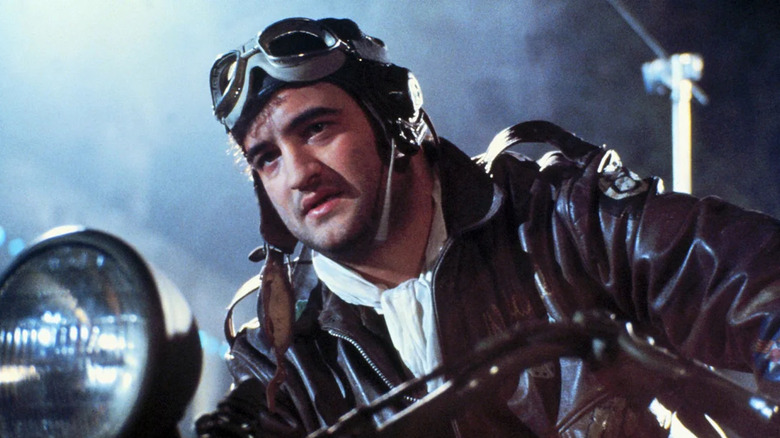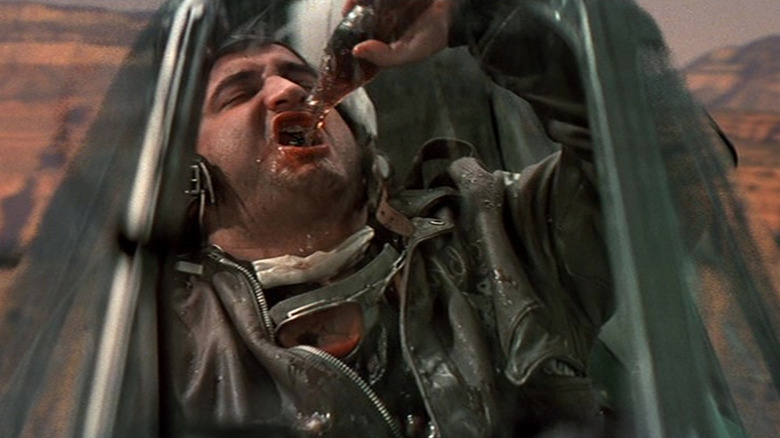Steven Spielberg Knows Exactly What Went Wrong With 1941
Everyone knows that Steven Spielberg's "1941" was a notorious box office flop. And everyone ... is wrong. Despite its reputation over the years, Spielberg's 1979 war comedy was not a box office failure. It just looked that way because, well, it was a Steven Spielberg movie. In '79, in the wake of the record-breaking box office juggernaut that was "Jaws" and its successful follow-up "Close Encounters of the Third Kind," Steven Spielberg seemed untouchable. It felt like the wunderkind director could not fail — that, like a cinematic King Midas, everything he touched would turn to gold.
"1941" changed that. While the film went on to become a modest box office success, taking in $94.9 million on a $35 million budget, it was not well received. Critics were mixed at best on the film. As Roger Ebert wrote, "The movie finally reduces itself to an assault on our eyes and ears, a nonstop series of climaxes, screams, explosions, double-takes, sight gags, and ethnic jokes that's finally just not very funny."
The production wasn't smooth — just as he had done on "Jaws," Spielberg found himself going over-schedule on "1941." But while all the gruelling work on "Jaws" ultimately paid off and essentially gave Spielberg free rein to do whatever the heck he wanted going forward, the fact that "1941" underperformed caused a shock to Spielberg's system. It made him realize that despite all the hype surrounding his filmmaking prowess, he was not infallible. The end result taught him a valuable lesson.
1941 taught Spielberg a lesson
In an interview with the DGA, Spielberg said that when he made "1941," he "wanted to make a really, really funny movie." The legendary filmmaker jokingly added: "I had never done a comedy before. And I haven't really made one since either." With a script from Robert Zemeckis and Bob Gale, who would go on to pen the Spielberg-produced "Back to the Future," Spielberg's "1941" is a chaotic, over-the-top story set in Los Angeles in the immediate aftermath of the Pearl Harbor attack — a fact that alienated John Wayne, an actor Spielberg wanted to star in the film. There's not much of a plot here, just a series of wacky set-pieces that Spielberg dials up to 11, working with a cast that includes Dan Aykroyd, John Belushi, Christopher Lee, Tim Matheson, Toshirō Mifune,, Warren Oates, Robert Stack, Treat Williams, Nancy Allen, Slim Pickens, and more.
As mentioned above, Spielberg made "1941" in the wake of two monster hits: "Jaws" and "Close Encounters of the Third Kind." This unparalleled success created a hubris within the young filmmaker. As he told the DGA, "I felt like I was made of Teflon. I felt that anything I put on film was going to succeed; that every laugh I set up would receive not only a laugh, but huge applause; that everybody was going to win an Academy Award."
Of course, that's not what happened. I'm a big Spielberg fan, and have gone to bat for many of his movies I feel are underrated and undervalued ("War Horse"? Great movie!). But "1941" is a misfire. It's not the worst thing Spielberg has ever made (that would be "Ready Player One," sorry), but it's too indulgent for its own good, and the production was too chatoic. And Spielberg is big enough to admit this. "I just became so precious and indulgent about getting everything right," the director said, adding that he "did 20 takes on inserts that should have been done by a second unit."
Thankfully, the disappointment was a learning experience for Spielberg. As he put it: "I learned the greatest lesson of my career, just from the experience of '1941,' and by the time I did 'Raiders of the Lost Ark,' my next picture, I was humbled. Every single shot was storyboarded. I was 14 days under schedule." The result speak for themselves: while "1941" has been deemed a failure, Spielberg's follow-up "Raiders of the Lost Ark" is considered to be one his best works.

